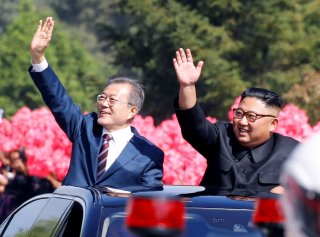Will South Korea's Elections Make Seoul Will Push Harder for a Peace Regime?
Full steam ahead?
In the midst of COVID-19, South Koreans cast their ballots (in person and via mail) in the country’s twenty-first legislative elections. The result was a landslide victory for the Democratic Party of Korea (DPK)—the incumbent majority party as well as that of President Moon Jae-in. The left-leaning DPK and its satellite party walked away with 180 seats (up from 128 in the last legislative cycle) while the conservative United Future Party (UFP) and its satellite were left with 103 (down from 112). Smaller parties and unaffiliated politicians took the remaining 17 seats. Instead of holding a small plurality of seats in a gridlocked National Assembly as it did during the last legislative cycle, the DPK now has three-fifths of all seats in the 300-person legislative body. The legitimacy of this election held during the coronavirus pandemic also can’t be questioned—66.2 percent of eligible South Koreans voted, the highest turnout rate in twenty-eight years. Based on these results, the Moon administration and DPK will have an unprecedented ability to pursue a left-leaning policy agenda.
This election had been cast as a referendum on the Moon administration. While Moon’s approval rating had fallen as low as 39 percent in October due to issues surrounding economic performance and personnel scandals, it’s rebounded to 59 percent in light of his administration’s widely-praised approach to COVID-19. Given that South Korean presidents are elected for a single five-year term, those in the second half of their term (as Moon is) are often seen as lame ducks. However, these results will embolden Moon as he pursues his policy agenda. They also make it easier for him and his party to move forward on controversial reforms—should the DPK vote as a consistent bloc, it can now control the entire legislative process short of revising the constitution. While Moon’s primary focus is likely to remain COVID-19 and economic recovery in the immediate future, these results give him a wider berth in pushing on issues like labor, economic, and prosecutorial reform. They also make it easier to pass legislation related to COVID-19 relief.
These results also suggest a potential for friction in the U.S.-South Korea alliance with regards to North Korea policy. As U.S.-North Korea diplomacy remains in a standstill in the aftermath of the Hanoi Summit, U.S. senators have called for tighter sanctions enforcement on North Korea. At the same time, President Moon has sought sanctions exemptions in order to pursue inter-Korea projects. Moreover, he has looked for opportunities for inter-Korean reconciliation—leading to a minor diplomatic tiff when U.S. Ambassador to South Korea Harry Harris stated that South Korea should run plans related to inter-Korea projects through a joint working group with the United States. The South Korean government appears to remain committed to Moon’s approach to North Korea policy—after the election, the South Korean Ministry of Unification stated that it would maintain its policy of enhancing inter-Korea cooperation.
With an overwhelming majority in the National Assembly, the DKP and President Moon have more political space to make progress on their preferred policies related to North Korea. This also makes it easier to create stronger legal structures around inter-Korea agreements—for example, the 2018 Pyongyang Joint Declaration and inter-Korean military agreement were signed by President Moon after his cabinet decided these agreements did not need the consent of the National Assembly despite protests from the opposition party of unconstitutionality. Now with its overwhelming majority, the DPK can avoid these sorts of controversies simply by following regular legislative procedures. While there is the possibility that President Trump may resume his diplomatic entreaties towards North Korea in earnest, a change in the presidency in the November elections is not likely to alleviate these U.S-South Korea tensions. Presumptive Democratic presidential nominee Joe Biden has stated that he will not continue President Trump’s personal diplomacy with North Korean leader Kim Jong-un and that he would continue tightening sanctions until North Korea denuclearizes. There are, however, lingering questions of how the South Korean public will respond to diplomatic overtures towards North Korea in light of recent North Korean missile tests.
While the DPK holds a strong majority and will be relatively unchecked in its ability to pursue its legislative agenda, conservatism is not dead in South Korea. The South Korean electoral system is a combination of first-past-the-post districts and proportional representation lists. This means that, due to recent electoral reforms, the DPK and UFP competed in single-member districts while affiliated satellite parties competed in the proportional representation contests. The DPK won 49.9 percent of votes in single-member districts while the UFP took 41.5 percent. However, the UFP’s satellite party narrowly edged out the DPK’s satellite party in the proportional representation vote—the UFP received 33.8 percent while the DPK took 33.3 percent. Furthermore, the UFP remains the dominant political party in traditional conservative strongholds in the southeast of the country.
Looking forward, this is an unprecedented era in South Korea politics. The DPK holds South Korea’s largest legislative majority in three decades as well as its largest left-leaning majority ever. While this does make it considerably easier to get things done, it also puts pressure on the majority to deliver since the minority can’t be blamed for derailing the National Assembly. President Moon stated that he feels “an immense sense of responsibility” in response to the election results. Winning was the first step—now it’s time for the DPK to show that it can maintain the people’s trust by putting policy into action.
Abby Bard is a graduate student in Asian Studies at Georgetown University’s School of Foreign Service, Pacific Forum Young Leader, and former research associate for Asia policy at the Center for American Progress. Image: Reuters

